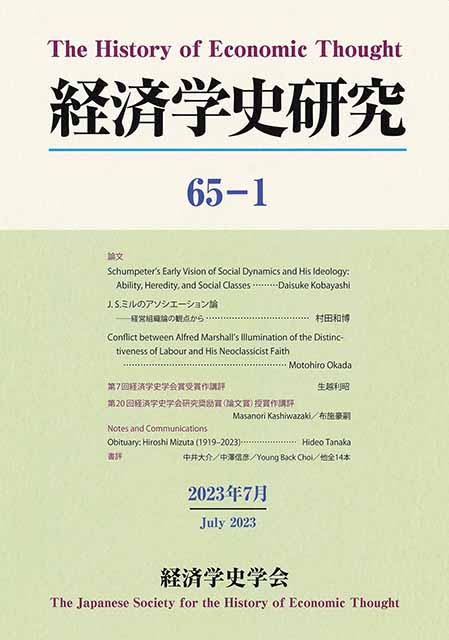Current issue
Displaying 1-20 of 20 articles from this issue
- |<
- <
- 1
- >
- >|
Article
-
Article type: research-article
2023 Volume 65 Issue 1 Pages 1-27
Published: July 25, 2023
Released on J-STAGE: February 03, 2024
Download PDF (1336K) -
Article type: research-article
2023 Volume 65 Issue 1 Pages 28-51
Published: July 25, 2023
Released on J-STAGE: February 03, 2024
Download PDF (1318K) -
Article type: research-article
2023 Volume 65 Issue 1 Pages 52-74
Published: July 25, 2023
Released on J-STAGE: February 03, 2024
Download PDF (1463K)
Review of the 7th JSHET Award Winner
-
Article type: Review of the 7th JSHET Award Winner
2023 Volume 65 Issue 1 Pages 75-77
Published: July 25, 2023
Released on J-STAGE: February 03, 2024
Download PDF (1124K)
Review of the 20th JSHET Young Scholar Award Winners
-
Article type: Review of the 20th JSHET Young Scholar Award Winners
2023 Volume 65 Issue 1 Pages 78-79
Published: July 25, 2023
Released on J-STAGE: February 03, 2024
Download PDF (1121K)
Notes and Communications
-
Article type: 【Notes and Communications】
2023 Volume 65 Issue 1 Pages 80-87
Published: July 25, 2023
Released on J-STAGE: February 03, 2024
Download PDF (1220K)
Book Review
-
Article type: book-review
2023 Volume 65 Issue 1 Pages 88-89
Published: July 25, 2023
Released on J-STAGE: February 03, 2024
Download PDF (1128K) -
Article type: book-review
2023 Volume 65 Issue 1 Pages 90-91
Published: July 25, 2023
Released on J-STAGE: February 03, 2024
Download PDF (1079K) -
Article type: book-review
2023 Volume 65 Issue 1 Pages 92-94
Published: July 25, 2023
Released on J-STAGE: February 03, 2024
Download PDF (1134K) -
Article type: book-review
2023 Volume 65 Issue 1 Pages 94-96
Published: July 25, 2023
Released on J-STAGE: February 03, 2024
Download PDF (559K) -
Article type: book-review
2023 Volume 65 Issue 1 Pages 96-98
Published: July 25, 2023
Released on J-STAGE: February 03, 2024
Download PDF (1134K) -
Article type: book-review
2023 Volume 65 Issue 1 Pages 98-100
Published: July 25, 2023
Released on J-STAGE: February 03, 2024
Download PDF (1082K) -
Article type: book-review
2023 Volume 65 Issue 1 Pages 100-102
Published: July 25, 2023
Released on J-STAGE: February 03, 2024
Download PDF (1083K) -
Article type: book-review
2023 Volume 65 Issue 1 Pages 102-104
Published: July 25, 2023
Released on J-STAGE: February 03, 2024
Download PDF (1083K) -
Article type: book-review
2023 Volume 65 Issue 1 Pages 104-106
Published: July 25, 2023
Released on J-STAGE: February 03, 2024
Download PDF (1083K) -
Article type: book-review
2023 Volume 65 Issue 1 Pages 106-108
Published: July 25, 2023
Released on J-STAGE: February 03, 2024
Download PDF (1082K) -
Article type: book-review
2023 Volume 65 Issue 1 Pages 108-110
Published: July 25, 2023
Released on J-STAGE: February 03, 2024
Download PDF (1083K) -
Article type: book-review
2023 Volume 65 Issue 1 Pages 110-112
Published: July 25, 2023
Released on J-STAGE: February 03, 2024
Download PDF (1082K) -
Article type: book-review
2023 Volume 65 Issue 1 Pages 112-114
Published: July 25, 2023
Released on J-STAGE: February 03, 2024
Download PDF (1081K) -
Article type: book-review
2023 Volume 65 Issue 1 Pages 114-116
Published: July 25, 2023
Released on J-STAGE: February 03, 2024
Download PDF (1080K)
- |<
- <
- 1
- >
- >|
